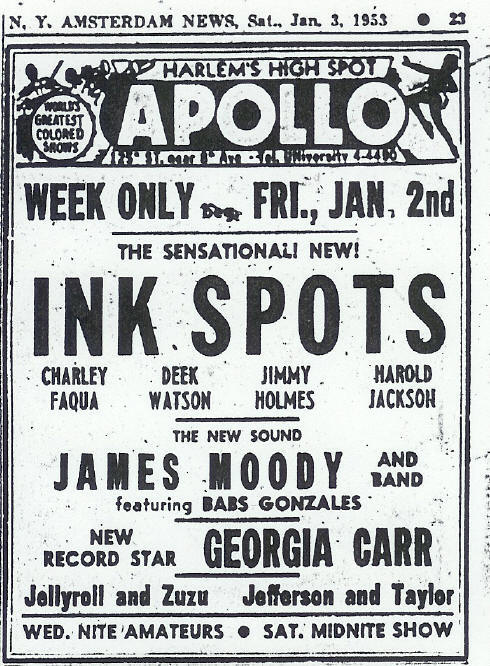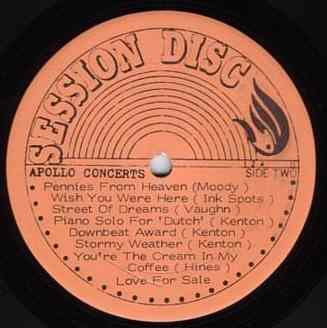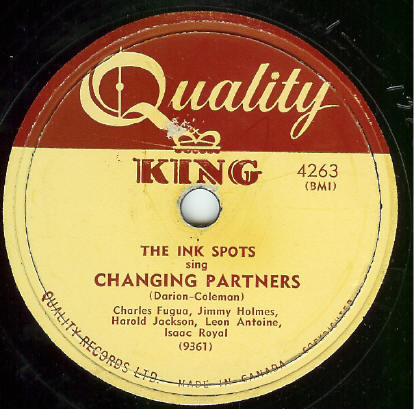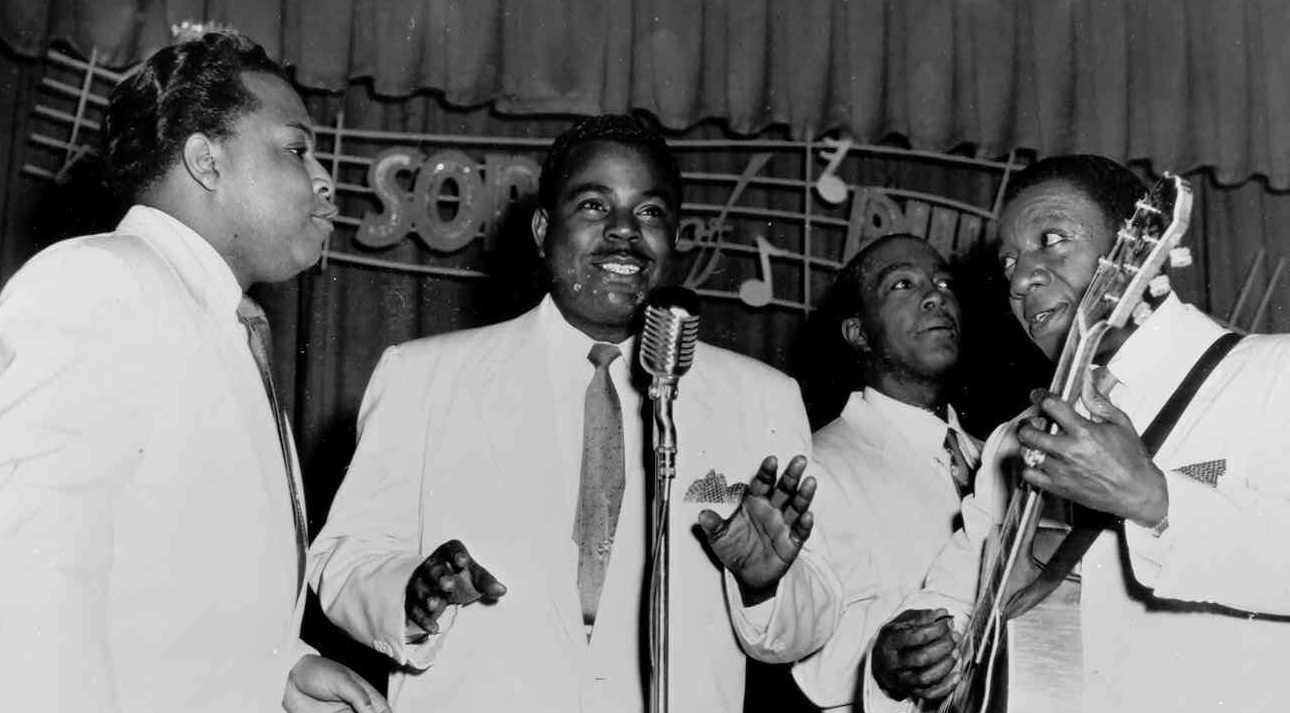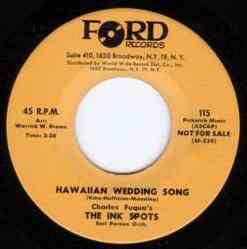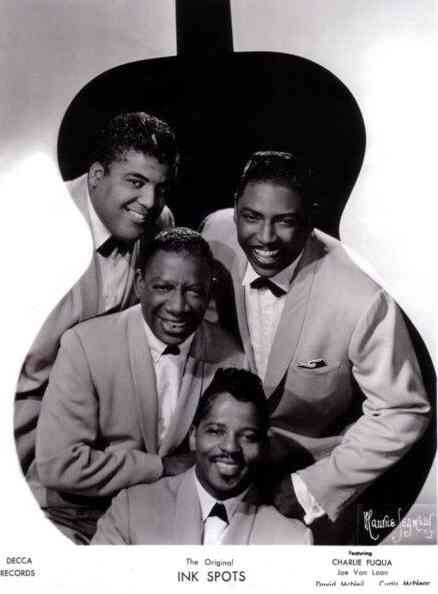|
THE SILENT INK SPOT Charlie Fuqua's main contribution to the Ink Spots was his guitar
playing including his simple but popular guitar introductions. Although
he sang solo on a few early recordings, Charlie increasingly just hummed
and played his guitar. It was the other three members who contributed
major components of what made the Ink Spots famous - Bill Kenny's soaring
tenor parts, Hoppy Jone's talking parts and Deek Watson's jive parts
and mannerisms on stage. Little is known of Charlie's earliest activities as a performer
and most of what is known comes from interviews much later in life.
Marv Goldberg states that, "...in 1928, guitarist Charlie Fuqua
started out with an aggregation called the Patent
Leather Kids, which also included Sid Ballantine[sic], Fred Wisdom,
Slick Helm, and Paul George." [More Than Words Can Say, 1998, p.
5.] There are no known songs by the Patent Leather Kids while Charlie
was a member. (Shortly after Charlie's departure, Syd Valentine formed a 10-member
Patent Leather Kids group and recordings under the Patent Leather Kids
name are from this group that included 'Doc' Wheeler Moran who later
led the Sunset Royals Band that toured with the Ink Spots. [Liner
notes by John Wilby, Gennett Rarities, Jazz Oracle, BDW8009]) "In the following year, Charlie left the Patent Leather Kids
and teamed up with Jerry Daniels (whom he knew from the neighborhood,
although they lived on different sides of a canal that ran through town).
The third member of this unnamed
coffee-pot band was Bernie Mackey." Marv Goldberg goes on to
say, based on an interview with Bernie Mackey in 1976, that Charlie
ran a shoe-shine stand across from the Stutz Bearcat factory where he
and the unnamed group would perform for workers. Sometime before June of 1931, Charlie Fuqua and Jerry Daniels parted
from Bernie Mackey to form a duet called Jerry
and Charlie. They appeared in vaudeville and on radio but nothing
is known of their vaudeville experiences except a possible tour in the
Midwest with the Whitman Sisters show. Beginning in June/31, they performed
more than 135 radio shows over WKBF(Indianapolis). The first broadcast
listed in Indianapolis newspapers is for 19 June/31 and the last was
on 28 Jun/32. According to Deek Watson [The Story of the Ink Spots, 1967], he met Jerry Daniels and Charlie Fuqua in Cleveland at the Majestic Hotel. The three formed a new group first called, possibly, the Gates Brothers and later renamed the King, Jack and Jester. They performed at the Club Madrid and over WHK in Cleveland and in late 1933 moved to Cincinnati where they performed many shows over radio stations WLW and WSAI until they left for New York about mid-1934 and became the Ink Spots. |
|
|
Charlie's Time With the Original Ink Spots At the time that the Ink Spots were formed in 1934, Charlie Fuqua's
importance was probably at its peak. The original group featured jive
numbers with fast string work, dancing and singing. While Jerry Daniels
may have been the better guitarist, Charlie Fuqua took a major role
as well. The entire group sang on most early numbers and Charlie even
had a few solo bits. After Bill Kenny's arrival and the beginning of
their huge success with the new ballad style that was popular with white
audiences, Charlie came to play a minor role and he is most identified
with the opening guitar introductions on these ballads. In September of 1943 Charlie, who was 1-A (Hoppy was too old at
38 and Deek and Bill were both 4-F), was drafted and entered the Army.
Since the group had agreed beforehand that any member who was drafted
would receive a full share, Charlie did not suffer financially. He stayed
in the U.S. and was playing in an army band by February in Camp Shanks,
NY. From September/43 till October/45 Charlie was replaced first by
Bernie Mackey and, in March of 1945, by Huey Long. Charlie returned
to the Ink Spots when they appeared at Glenn's Rendezvous in Newport,
KY beginning 26Oct/45. He remained with the group until August of 1952
where his final Ink Spots performances were at The Frolics in Salisbury
Beach, MA. The major factors leading to Charlie's departure were, no doubt, Bill Kenny's increasing solo activities and his refusal to let the other Ink Spots appear on Ink Spots Decca recordings after Herb Kenny left the group. |
|
|
After the Original Ink Spots: After Charlie Fuqua left Bill Kenny in August of 1952, he formed
his own Ink Spots group. To form his group, Charlie recruited Deek Watson,
Jimmy Holmes and Harold Jackson as members. His concern about his decreasing
role in Bill Kenny's group is supported by his claim that his new quartet
would have (and did have) more group singing. The formation of Charlie's
Ink Spots resulted in there being two "official" Ink Spots
groups performing for a brief period. Bill Kenny tried to stop Charlie Fuqua from using the Ink Spots
name by challenging Fuqua in court concerning the rights to the name
"Ink Spots" but he was not sucessful. Some confusion but,
also, some indifference to the existence of the two groups seems to
have resulted from the formation of Charlie's Ink Spots. With a few exceptions when he was a member of other Ink Spots groups, Charlie then had a succession of his own groups that continued, as listed below, right up to the year of his death in 1971. The exceptions were was when he joined fellow original Ink Spot Deek Watson again in 1963 with a group that included a tour of Australia in their schedule and when he joined Ray Richardson's Ink Spots near the end of his careeer is 1969-70. |
Charlie's new group appeared at the Apollo Theater for one week beginning 2Jan/53 |
|
CHARLIE FUQUA GROUPS AND RECORDINGS (after leaving the original Ink Spots): Sep1952-early 1953 INK SPOTS-Charlie Fuqua, Deek Watson, Jimmy Holmes and Harold Jackson Wish You Were Here, on "Hooray for the world famous harlem new york apollo concerts, #124, 15 live performances from the Apollo. We believe that this is the only song in existence for this group and it is not easily available. The above album with numbers 124A and 7373SR in the dead wax on one side and 124B and 7373SR on the other may have been issued but we do not know. Bootleg copies do exist and Greg Centamore has provided the scan of the label from his copy of this record. It is likely that this song was recorded at one of the group's Apollo appearances during the week of 2Jan/53. |
|
|
Early 1953 to early 1956?-Two groups, that differed as to the person who replaced Deek Watson, existed during the period they recorded for King records: Group 1-Charlie Fuqua, Leon Antoine, Jimmy Holmes Harold Jackson and pianist Issac Royal Group 2-Charlie Fuqua, Essex Scott, Jimmy Holmes and Harold Jackson and pianist Issac Royal Movie-The Ink Spots, Universal Pictures, 15 minutes, 1955, featured Group 2. Which of these groups were on each King record is uncertain in at least some cases. We have listed the group members indicated on the King record labels where they are shown. If the label names and King recording dates we have are correct, it would mean that both groups made recordings on the same dates in some cases (the first recording date - 17Sep/53, plus 11Dec/53, and 11Jul/54) and we wonder how this would have happened. Other explanations could be that some label listings were in error (Bill Proctor says this is so in at least two cases as noted below) and/or recording dates are incorrect. Any additional help in identifying the groups that recorded each record would be welcome. |
|
|
KING recordings: 1297, Ebb Tide-K9342/If You Should Say Goodbye-K9343,
recorded 11Nov/53, released Dec/53. No group on label. |
|
|
Late 1956 to early 1958?-Charlie Fuqua, Jimmy Holmes, Harold Jackson and Charlie Owens
Verve 10071, Darling, Don't Cry-21103/You Name It-21101, recorded
25Jun/57, released Jul/57. LP: Verve 2039, Charlie Fuqua's Ink Spots. |
|
|
1958 group?-Charlie Fuqua, Tommy Evans and unknown members There was a Verve recording session but no records were released and other members are not known. |
|
|
1959 group?-Charlie Fuqua, Leon Antoine, Joe Skyles, David McNeil Verve 10198, Secret Love-22860/A Little Bird Told Me-22880, recorded 20Aug/59 and 31Aug/59, released Oct/59. LP: Verve 2124, Ink Spots Favorites. |
|
|
1960-62? Charlie Fuqua, leader, baritone, guitar; Joe Van Loan, 1st tenor; David McNeil, bass; Curtis McNair, 2nd tenor We believe this group made one recording with Earl
Pames Orchestra:
|
Top to bottom: Joe Van Loan, David McNeil, Charlie Fuqua, Curtis
McNair |
|
1963-Deek Watson, Charlie Fuqua, Lloyd Washington,
George Holmes (Charlie was a member of this Watson group)
|
|
|
1963?-Charlie Fuqua, Charlie Owens, Gene Mumford,
George Holmes
|
|
|
1964-66?-Charlie Fuqua, Adriel McDonald, Abel De
costa, John Taylor
|
|
|
1967-71?-Charlie Fuqua, David McNeil, Jimmy Foster,
Raymond Reid
|
|
|
1969-70?-Ray Richardson, Joe Van Loan, Al Williams,
Charlie Fuqua and Bobby Smith
|
|
| Note: Much of the information on Charlie Fuqua Ink Spots groups beginning in 1952 is available thanks to the work of Greg Centamore and Marv Goldberg. | |
Revised - 5Mar/06

